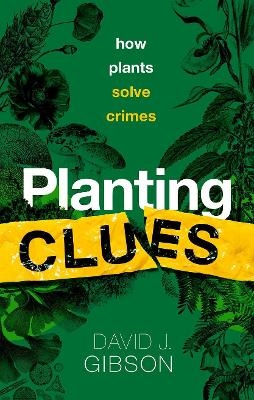
Planting Clues
How plants solve crimes
Seiten
2022
Oxford University Press (Verlag)
978-0-19-886860-6 (ISBN)
Oxford University Press (Verlag)
978-0-19-886860-6 (ISBN)
David Gibson explores the role played by plants (and fungi) in investigating crime. Highlighting a range of real cases in which botanical evidence was involved, he describes how leaves, seeds, and moss fragments can link a suspect to a crime scene. He also considers cases in which plants themselves can be the subject of crime.
Discover the extraordinary role of plants in modern forensics, from their use as evidence in the trials of high profile murderers such as Ted Bundy to high value botanical trafficking and poaching.
We are all familliar with the role of blood spatters or fingerprints in solving crimes, from stories in the media of DNA testing or other biological evidence being used as the clinching evidence to incriminate a killer. This book lifts the lid on the equally important evidence from plants at a crime scene, from the incriminating presence of freshwater plants in the lungs of a drowning victim, to rare botanical poisons in the evening gin and tonic, to exotic trafficked flowers and drugs.
In Planting Clues, David Gibson explores how plants can help to solve crimes, as well as how plant crimes are themselves solved. He discusses the botanical evidence that proved important in bringing a number of high-profile murderers such as Ian Huntley (the 2002 Shoham Murders), and Bruno Hauptman (the 1932 Baby Lindbergh kidnapping) to trial, from leaf fragments and wood anatomy to pollen and spores. Throughout he traces the evolution of forensic botany, and shares the fascinating stories that advanced its progress.
Discover the extraordinary role of plants in modern forensics, from their use as evidence in the trials of high profile murderers such as Ted Bundy to high value botanical trafficking and poaching.
We are all familliar with the role of blood spatters or fingerprints in solving crimes, from stories in the media of DNA testing or other biological evidence being used as the clinching evidence to incriminate a killer. This book lifts the lid on the equally important evidence from plants at a crime scene, from the incriminating presence of freshwater plants in the lungs of a drowning victim, to rare botanical poisons in the evening gin and tonic, to exotic trafficked flowers and drugs.
In Planting Clues, David Gibson explores how plants can help to solve crimes, as well as how plant crimes are themselves solved. He discusses the botanical evidence that proved important in bringing a number of high-profile murderers such as Ian Huntley (the 2002 Shoham Murders), and Bruno Hauptman (the 1932 Baby Lindbergh kidnapping) to trial, from leaf fragments and wood anatomy to pollen and spores. Throughout he traces the evolution of forensic botany, and shares the fascinating stories that advanced its progress.
David J. Gibson is Professor of Plant Biology and University Distinguished Scholar at Southern Illinois University Carbondale. He is Senior Editor of the Journal of Ecology, and author of a number of books, including Grasslands and Climate Change (2019, with J. A. Newman), Methods in Comparative Plant Population Ecology, 2nd edition (2015) and Grasses and Grassland Ecology (2009).
Prologue: An Entangled Bank 1: A Tree Never Lies 2: Everything That's Touched 3: Getting Caught Up 4: Every Particle Tells A Story 5: It's in the Genes 6: A Forensic Pharmacopoeia 7: Hiding in Plain SightCoda: Moving Forward
| Erscheinungsdatum | 06.08.2022 |
|---|---|
| Zusatzinfo | 10 black and white images and 4 Colour Plates |
| Verlagsort | Oxford |
| Sprache | englisch |
| Maße | 142 x 220 mm |
| Gewicht | 376 g |
| Themenwelt | Sachbuch/Ratgeber ► Natur / Technik |
| Naturwissenschaften ► Biologie ► Botanik | |
| Recht / Steuern ► Strafrecht ► Kriminologie | |
| ISBN-10 | 0-19-886860-X / 019886860X |
| ISBN-13 | 978-0-19-886860-6 / 9780198868606 |
| Zustand | Neuware |
| Informationen gemäß Produktsicherheitsverordnung (GPSR) | |
| Haben Sie eine Frage zum Produkt? |
Mehr entdecken
aus dem Bereich
aus dem Bereich
Gefäßpflanzen: Grundband
Buch | Hardcover (2021)
Springer Spektrum (Verlag)
44,99 €
Diversität, Morphologie, Ökologie und Evolution der Pilze
Buch | Softcover (2023)
Springer (Verlag)
49,99 €
ein Baum erzählt seine erstaunliche Geschichte
Buch | Hardcover (2024)
Ludwig (Verlag)
23,00 €


